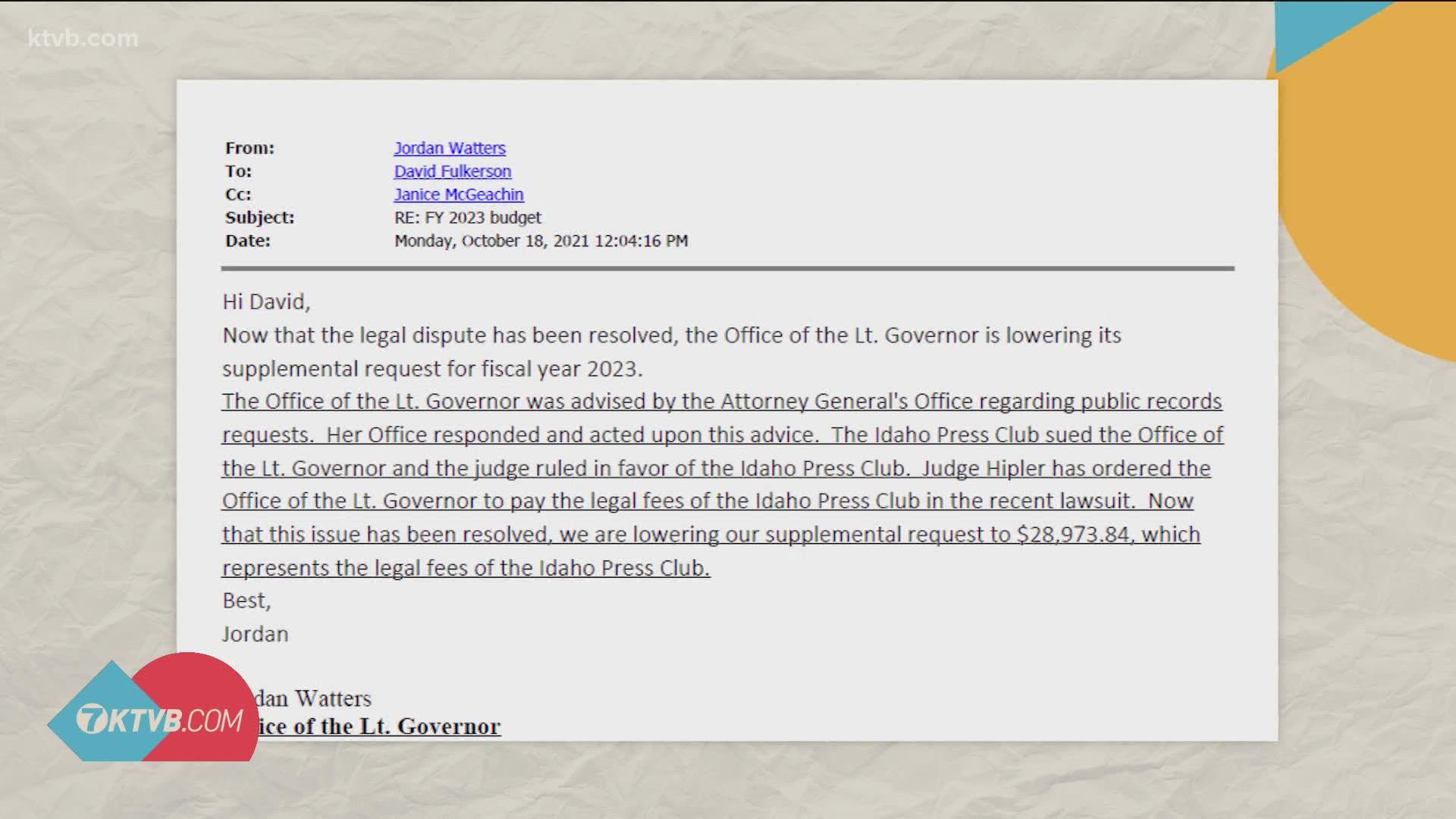BOISE, Idaho — Idaho Lt. Gov. Janice McGeachin's legal battle with the Idaho Press Club has left Idahoans with countless unanswered questions, including how much the whole ordeal will cost taxpayers.
McGeachin was fined $750 by an Idaho judge in August for what he referred to as "bad faith" violations of the Idaho Public Records Act after she initially refused to release public records from her education task force.
Eventually, McGeachin released the records from her task force after the Idaho Press Club asked a judge to hold her in contempt of court for failing to release them.
The judge also ordered McGeachin to pay $28,596.50 in court costs and legal fees to cover the legal costs the Idaho Press Club acquired during their successful case.
The nearly $29,000 does not include private legal fees McGeachin accrued after she opted to not work with the Idaho Attorney General's Office.
McGeachin submitted a supplemental budget request to the state in late August, requesting $50,000 to "pay for legal bills that cannot be covered by the Lt. Governor's Office current budget without reducing staff hours and constituent services."
The money McGeachin requested will be brought before the Joint Finance Appropriations Committee as a "supplemental budget" to the lieutenant governor's 2023 fiscal year budget. The hearing is set to take place this week.
KTVB submitted a public records request for any records involving McGeachin's outside legal fees and consultation. However, the request was denied, with officials stating:
Specifically, the Lt. Governor is denying your public records request on outside legal consultation.
Attorney-client privilege is part of state law, see Idaho Code 9-203(2), and is further explained in Idaho Rules of Evidence (I.R.E.) Rule 502. Furthermore, Idaho Code 74-104(1) clarifies that any public records made exempt from disclosure by state or federal law are also exempt from disclosure under Idaho public records law.
Records between the Lt. Governor's Office and that of legal counsel are protected by attorney-client privilege and are therefore exempt from disclosure.
As of this date, the Office has not received any invoices for outside legal fees.
McGeachin is permitted to discuss how much money she spent on legal fees with a private attorney. Attorney-client privilege does not prevent her from discussing it.
The Idaho Joint Democratic Caucus, which is made up of lawmakers that serve on the Joint Finance Appropriations Committee, sent out a letter on Monday afternoon asking the lieutenant governor's office to release several pieces of documentation.
In the request, the caucuses asked to see documents of how her office plans to pay her legal fees, the Attorney General's opinion, an unredacted copy of the engagement between McGeachin and her private attorney, and copies of all invoices.
Caucus members said those documents will help them decide whether or not her request will be granted.
KTVB received a copy of the Attorney General's opinion on Monday. During a press conference held by McGeachin in Ammon last week, she claimed the Attorney General's office gave her bad advice but failed to explain what the advice was.
However, she did claim she was told to seek outside legal counsel.
In an email to the lieutenant governor's office, Deputy Attorney General Rachel Kolts told Jordan Watters, McGeachin's chief of staff, that the office did not believe McGeachin could redact certain information as a part of the Idaho Press Club's public records request.
The email states, in part:
As it currently stands, the only exemption within the Public Records Act that would likely survive a challenge would be the one provided for in Idaho Code section 74-106(4)(h), allowing for a minor’s name to be redacted to show only the minor’s initials and not the minor’s full name. It is unlikely that the legislative exemption we previously discussed with you could survive a challenge if relied upon. The factors indicating that it could be available are no longer applicable. Specifically, the analysis we provided earlier was prior to the Task Force being named and convened. Based on what we now understand to be the construction and makeup of the Task Force, it does not appear to meet the criteria of the legislative exemption.
We recommend that your office review the full spreadsheet for any redactions pursuant to 74-106(4)(h) and produce the full spreadsheet to Ms. Dutton as soon as possible and no later than the end of the business day tomorrow. If you disagree with our advice, you may wish to seek a second opinion from other counsel.
Join 'The 208' conversation:
- Text us at (208) 321-5614
- E-mail us at the208@ktvb.com
- Join our The 208 Facebook group: https://www.facebook.com/groups/the208KTVB/
- Follow us on Twitter: @the208KTVB or tweet #the208 and #SoIdaho
- Follow us on Instagram: @the208KTVB
- Bookmark our landing page: /the-208
- And we also turn each episode into a podcast on Podbean
- Still reading this list? We're on YouTube, too:

